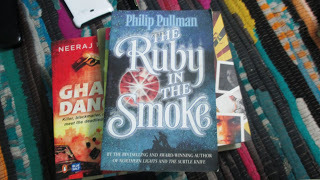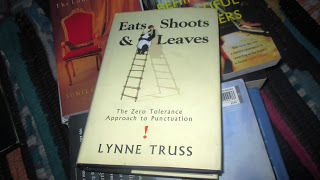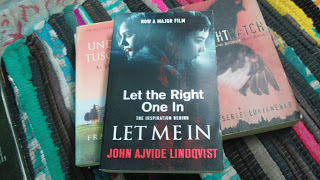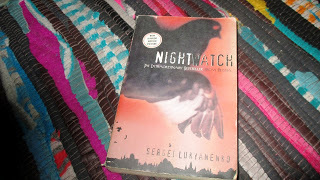Dibyajyoti Sarma's Blog, page 29
February 19, 2016
Culture according to Umberto Eco: “If culture did not fil...
Culture according to Umberto Eco: “If culture did not filter, it would be inane—as inane as the formless, boundless Internet is on its own. And if we all possessed the boundless knowledge of the Web, we would be idiots! Culture is an instrument for making a hierarchical system of intellectual labor. For you and for me it is enough to know that Einstein proposed the theory of relativity. But an absolute understanding of the theory we leave to the specialists. The real problem is that too many are granted the right to become a specialist.”
At one level, it feels like he was talking about India this week.
A true interpreter of our time, Eco, who passed away on 19 February 2016, credited our awareness to mortality to the invention of comedy: “All men are mortal. We are able to do it, and that is probably why there are religions, rituals, and what have you. I think that comedy is the quintessential human reaction to the fear of death. If you ask me for something more, I cannot tell you. But perhaps I’ll create an empty secret now, and let everyone think that I have a theory of comedy in the works, so when I die they will spend a lot of time trying to retrieve my secret book.”
Oh, he wrote that book. It’s called The Name of the Rose.
More Here/
At one level, it feels like he was talking about India this week.
A true interpreter of our time, Eco, who passed away on 19 February 2016, credited our awareness to mortality to the invention of comedy: “All men are mortal. We are able to do it, and that is probably why there are religions, rituals, and what have you. I think that comedy is the quintessential human reaction to the fear of death. If you ask me for something more, I cannot tell you. But perhaps I’ll create an empty secret now, and let everyone think that I have a theory of comedy in the works, so when I die they will spend a lot of time trying to retrieve my secret book.”
Oh, he wrote that book. It’s called The Name of the Rose.
More Here/
Published on February 19, 2016 18:20
February 12, 2016
Ruby in the Smoke
Published on February 12, 2016 05:20
Eats, shoots and leaves
Published on February 12, 2016 05:19
Let Me In
Published on February 12, 2016 05:18
Nightwatch
Published on February 12, 2016 05:17
February 11, 2016
Beautiful Losers by Leonard Cohen
You cannot even imagine this book being written today. It’s blasphemous, to put is nicely. The narrator wants to sleep with a Christian saint, for God’s sake. He basically cannot think of anything else, other than sex, the memory of him doing it with his dead wife and his dead male friend. Oh, he also talks about the Native Americans (The First Nation People, to be politically correct) in Canada, during the coming of the French. This narrator is a first-rate degenerate, and he is created by everyone’s favourite good guy, Leonard Cohen (Remember, when he croons ‘I’m Your Man’, you believe he is singing only for you, just you!)
Aside from apparent perversity and nihilism, the book is also breathless, and moves between past and present and various things in between, and this all can be very exhausting. It is an obsessive fever dream, with no redemption in sigh.
And in the context of today’s political correctness, you will have a lot of problem. (These is a rape sequence in the beginning of the book, which is disturbing in worse possible way, not just the description, the how the narrator inserts his own perversity into the retelling!)
But, stick to it, and it has its rewards. The book is erudite. Though the whole thing runs like a long rant, by the end of it, you have the feeling Cohen knew what he was doing. And he did it well. Sometimes perversity is good.
Aside from apparent perversity and nihilism, the book is also breathless, and moves between past and present and various things in between, and this all can be very exhausting. It is an obsessive fever dream, with no redemption in sigh.
And in the context of today’s political correctness, you will have a lot of problem. (These is a rape sequence in the beginning of the book, which is disturbing in worse possible way, not just the description, the how the narrator inserts his own perversity into the retelling!)
But, stick to it, and it has its rewards. The book is erudite. Though the whole thing runs like a long rant, by the end of it, you have the feeling Cohen knew what he was doing. And he did it well. Sometimes perversity is good.
Published on February 11, 2016 23:12
February 6, 2016
Print at NSD’s Bharat Rang Mahotsav
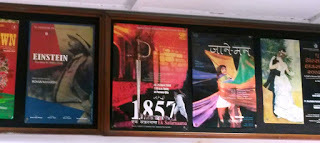
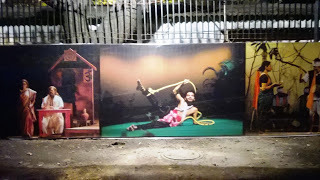
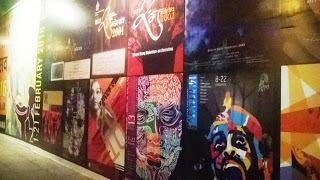
 Like the way Bhakti poets saw God everywhere, we print people tend to see print everywhere. We would attend a public event and the first thing we would notice would be the prints. We would carefully study the quality of the wide-format displays, their substrate, their design and colour, the quality of the print job. We would try to guess which machine was used, or perhaps, which printer did the job.
Like the way Bhakti poets saw God everywhere, we print people tend to see print everywhere. We would attend a public event and the first thing we would notice would be the prints. We would carefully study the quality of the wide-format displays, their substrate, their design and colour, the quality of the print job. We would try to guess which machine was used, or perhaps, which printer did the job. This is exactly what happened when we visited the 18th Bharat Rang Mahotsav, the annual International theatre festival hosted by the National School of Drama, which is on from 1-21 February 2016 at its premises in New Delhi.
What caught our attention were the large posters, depicting the scenes from the plays to be performed, adorning the outer walls of the venue, from the Mandi House Metro station to all the way across Bhagwan Das Road, where the institute is located. The life-like pictures of the stage actors in the middle of their act (printed on flex), next to the busy sidewalk, is indeed a heartening sight, especially in our time when such large OOH displays are reserved for promoting multinational companies.
Talking about posters, the NSD building is a veritable museum of classic theatre posters, from pre-Independence to the heydays of 1970s to our time. Printed on A3 size paper, in multicolour, NSD has loving framed and displayed the posters of all the plays that were performed at the institute over the years. While the posters themselves are a study in the changing style of design and representation, they also hold within them the living history of the Indian theatre.
Published on February 06, 2016 13:28
Proposed provision in book bill could land you in jail
As we celebrate the rise of publishing in India, here is a bit of news we need to watch out for.
The ministry of culture, government of India, is seeing to repeal a certain provisions in the existing ‘The Delivery of Books and Newspapers (Public Libraries) Act, 1954’ with the ‘Deposit of Books, Newspapers and Electronic Publications in Libraries Bill 2016. The bill is now with the legislative department of the law ministry.
The bill seeks to replace a pre-digital-era avatar identified as ‘obsolete’ and fit for repeal, as it does not take into account eBooks.
However, there is a catch, as the bill suggests harsher punishment for those who do follow the rules. According to the proposed bill, failure to deposit their books with designated libraries can land publishers in jail. “Two-year jail term for non-delivery of books” is one of the two penalties being considered in a bill.
The law was originally drafted to develop four public libraries in different parts of India to encourage scholarship. According to the law, a copy of every book has to be deposited with the National Library in Calcutta and three other libraries - Connemara Public Library (Chennai), Asiatic Society Library (Mumbai) and Delhi Public Library in the capital.
The old law does have a penal provision -- a fine equivalent to the value of the book. The ministry is proposing to scale up the fine 500 times the cost of the book in addition to the two-year jail term.
The procedure for submissions will be simplified. Only two copies, instead of four, of a book have to be deposited; one to the National Library and the other to a state central library.
The relevant provisions of the bill have been uploaded for information of all stakeholders/public at the ministry of culture website (http://www.indiaculture.nic.in/deposi...).
The objections or suggestions, if any, may be addressed to Director (Libraries), Ministry of Culture, Shastri Bhawan, New Delhi 1 or sent by e-mail to Librarysection886@gmail.com, niraj.sinha@nic.in on or before 29 February, 2016.
The ministry of culture, government of India, is seeing to repeal a certain provisions in the existing ‘The Delivery of Books and Newspapers (Public Libraries) Act, 1954’ with the ‘Deposit of Books, Newspapers and Electronic Publications in Libraries Bill 2016. The bill is now with the legislative department of the law ministry.
The bill seeks to replace a pre-digital-era avatar identified as ‘obsolete’ and fit for repeal, as it does not take into account eBooks.
However, there is a catch, as the bill suggests harsher punishment for those who do follow the rules. According to the proposed bill, failure to deposit their books with designated libraries can land publishers in jail. “Two-year jail term for non-delivery of books” is one of the two penalties being considered in a bill.
The law was originally drafted to develop four public libraries in different parts of India to encourage scholarship. According to the law, a copy of every book has to be deposited with the National Library in Calcutta and three other libraries - Connemara Public Library (Chennai), Asiatic Society Library (Mumbai) and Delhi Public Library in the capital.
The old law does have a penal provision -- a fine equivalent to the value of the book. The ministry is proposing to scale up the fine 500 times the cost of the book in addition to the two-year jail term.
The procedure for submissions will be simplified. Only two copies, instead of four, of a book have to be deposited; one to the National Library and the other to a state central library.
The relevant provisions of the bill have been uploaded for information of all stakeholders/public at the ministry of culture website (http://www.indiaculture.nic.in/deposi...).
The objections or suggestions, if any, may be addressed to Director (Libraries), Ministry of Culture, Shastri Bhawan, New Delhi 1 or sent by e-mail to Librarysection886@gmail.com, niraj.sinha@nic.in on or before 29 February, 2016.
Published on February 06, 2016 13:03
February 2, 2016
Urdu author Intizar Husain passes away at 92
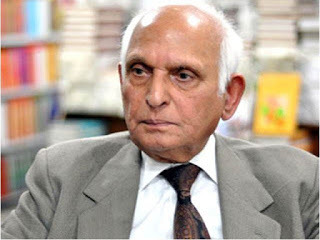 India-born Pakistani author, Intizar Husain, considered to be one of the greatest writers of Urdu, passed away on 2 February 2016 in Lahore, Pakistan. He was 92.
India-born Pakistani author, Intizar Husain, considered to be one of the greatest writers of Urdu, passed away on 2 February 2016 in Lahore, Pakistan. He was 92. Revered by readers of Urdu and Hindi, Husain, whose works have been translated into English only sporadically, received a late but deserving recognition when he was shortlisted for the Man Booker International Prize in 2013. He was also awarded France's Ordre des Arts et des Lettres in 2014.
A chronicler of change, Husain was a short story writer, novelist, columnist and poet. Today, he is known for his five novels and seven collections of short stories.
Basti, his 1979 novel, traces the history of Pakistan through the life of one man, Zakir. This is his only novel, which has been translated into English, by Frances W Pritchett, besides five volumes of his short stories. Basti was recently republished as one of the New York Review of Books classics.
In the novel, Zakir lives in a dynamic, conflictual and contradictory world. Throughout the novel, there are threads of nostalgia, displacement and ruptured continuities. The Partition of India in 1947 is the centre of the novel’s sombre, impressionistic landscape. That year turns everything topsy-turvy, and more so, it transforms the fate of the basti (settlement).
Among his other books, Naya Gar (The New House), paints a picture of Pakistan during the ten-year dictatorship of General Zia-ul-Haq. Agay Sumandar Hai (Ahead is the Sea) contrasts the spiraling urban violence of contemporary Karachi with a vision of the lost Islamic realm of al-Andalus, in modern Spain.
His other works include Hindustan Se Aakhri Khat (The Last Letter from India), Shehr-e-Afsos, Janam Kahanian and Wo Jo Kho Gaye (Those Who are Lost).
Husain is known for his nostalgia for older places and phenomena. Keki Daruwalla, writing in The Hindu in 2003, said, “Intizar Husain’s stories often tread that twilight zone between fable and parable. And the narrative is spun on an oriental loom.”
Born on 7 December 1923 in Dibai, Bulandshahr, Husain migrated to the newly formed Pakistan in 1947, an experience he wrote about 50 years later in The First Morning. The short story captures the horror and optimism that accompanied the Partition of India where an estimated 14 million people were displaced, the largest mass migration in human history.
He had a master’s degree in Urdu and worked for the Urdu daily, Imroze, and later, the Urdu daily Mashriq.
He was also a regular literary columnist for Pakistan’s leading English-language daily Dawn, and in later years became known as a voice of moderation and advocate of what he saw as the subcontinent’s ancient traditions of pluralism and tolerance.
He received the Lifetime Achievement award at the Lahore Literary Festival in 2012.
Husain’s wife Aliya Begum died in 2004. The couple had no children.
Fellow Urdu writer Munnu Bhai told the media after his death: “Intizar Husain was a man of letters. His death has left a huge gap in the literary circle of the subcontinent that would be felt of the centuries to come.”
Author Kamila Shamsie twitted, “Cruel of the world to take away both Urdu literature’s great Husains, Abdullah and Intizar, in such a short period.”
Read Intizar Husain’s novel Basti online HERE/
(From news sources)
Published on February 02, 2016 13:37
January 28, 2016
Embrace of the Serpent
Published on January 28, 2016 04:14

